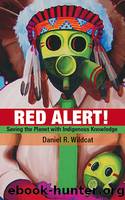Red Alert! by Daniel Wildcat

Author:Daniel Wildcat
Language: eng
Format: epub
Publisher: Fulcrum Publishing
Published: 2014-11-20T07:00:00+00:00
Chapter Five
Indigenous Knowledges:
Where We Touch the Earth
Some will find the proposal to save the planet with indigenous knowledges incredible: What an unrealistic reverie! What a modern-American-sounding hubris-ridden declaration. Most of those individuals will never turn a page in this book. But for those willing to consider that useful knowledge and wisdom for humankind might be found in indigenous tribal traditions, honesty requires that such a claim be explained.
Indigenous Knowledges: Collaborative Systems of Knowing
The proposal to use indigenous knowledges to save the Earth denotes knowledge as something not passively found in ânature,â but something found in the experiential exploration of our human place within the natural world. The Native insight that indigenous knowledges should not be strictly understood as human constructions, but rather as collaborations, is worth emphasizing. Indigenous knowledges in this sense are emergent from the nature-culture nexus. Consequently, indigenous knowledges are a set of relations and relationships situated in our life experiences, which vary as we move through what physicists would call space-time.
The increasing impoverishment of life on Earth is overwhelmingly a cultural product. After a five-centuries-
old imposition of Eurocentric institutions around the globe, the world might benefit from a serious examination and discussion of indigenous ideas found among the First Peoples of North America. It is ironic that American Indian lifeways and worldviews, exceptional for their practicality, are inevitably cast by modern societies as full of myth and romanticized recollections. Indigenous ingenuity (indigenuity) can help us deal with the fundamental cultural crisis that threatens much of Mother Earthâs life system, for the global burning we are immersed in is ultimately about how a great number of humankind currently livesâit is about the lifestyles that have been sold to us.
New Age secrets and formulae, and exoticized platitudes of mythological tribal origin, are absent in these pages. What is offered here is neither exotic nor romantic, but practical and philosophical. What the world needs today is a good dose of indigenous realism. We need knowledges that emerged through hundreds and often thousands of years of interaction with ecosystems and larger environments. Humankind can benefit from indigenous knowledges, identified as realistic, precisely because they often resulted in sustainable life-enhancing social institutions and material cultures.
Indigenous knowledges are grounded in the human realization that the life that surrounds us can teach us valuable lifeway lessons, if we pay attention to our relationships and interactions with the land, air, water, and other-than-human living beings. The hard-fact skeptics will likely
ridicule any such claim, but their attitude is largely explained by ignorance. For these empiricists have typically lived the vast majority of their lives inside human-designed and -constructed interiors. Human beings who spend time with animals or live a large part of their lives outside the walls of man-made buildings and exercise attentiveness to their environment universally affirm the existence of intraspecies communication systems.
Current scientific research on animal communication overwhelmingly verifies the existence of complex communication systems. Honesty and humility require us to acknowledge that indigenous knowledge, in its diverse substance and structure, is the result of collaboration, a respectful partnership, between us and our many other-than-human relatives.
Download
This site does not store any files on its server. We only index and link to content provided by other sites. Please contact the content providers to delete copyright contents if any and email us, we'll remove relevant links or contents immediately.
Machine Learning at Scale with H2O by Gregory Keys | David Whiting(4295)
Never by Ken Follett(3937)
Harry Potter and the Goblet Of Fire by J.K. Rowling(3848)
Unfinished: A Memoir by Priyanka Chopra Jonas(3381)
Fairy Tale by Stephen King(3370)
The Man Who Died Twice by Richard Osman(3072)
Will by Will Smith(2911)
Rationality by Steven Pinker(2352)
It Starts With Us (It Ends with Us #2) by Colleen Hoover(2344)
Can't Hurt Me: Master Your Mind and Defy the Odds - Clean Edition by David Goggins(2324)
The Dark Hours by Michael Connelly(2300)
The Storyteller by Dave Grohl(2229)
Friends, Lovers, and the Big Terrible Thing by Matthew Perry(2219)
The Dawn of Everything: A New History of Humanity by David Graeber & David Wengrow(2197)
The Becoming by Nora Roberts(2189)
The Stranger in the Lifeboat by Mitch Albom(2113)
Cloud Cuckoo Land by Anthony Doerr(2101)
Love on the Brain by Ali Hazelwood(2062)
Einstein: His Life and Universe by Walter Isaacson(2011)
